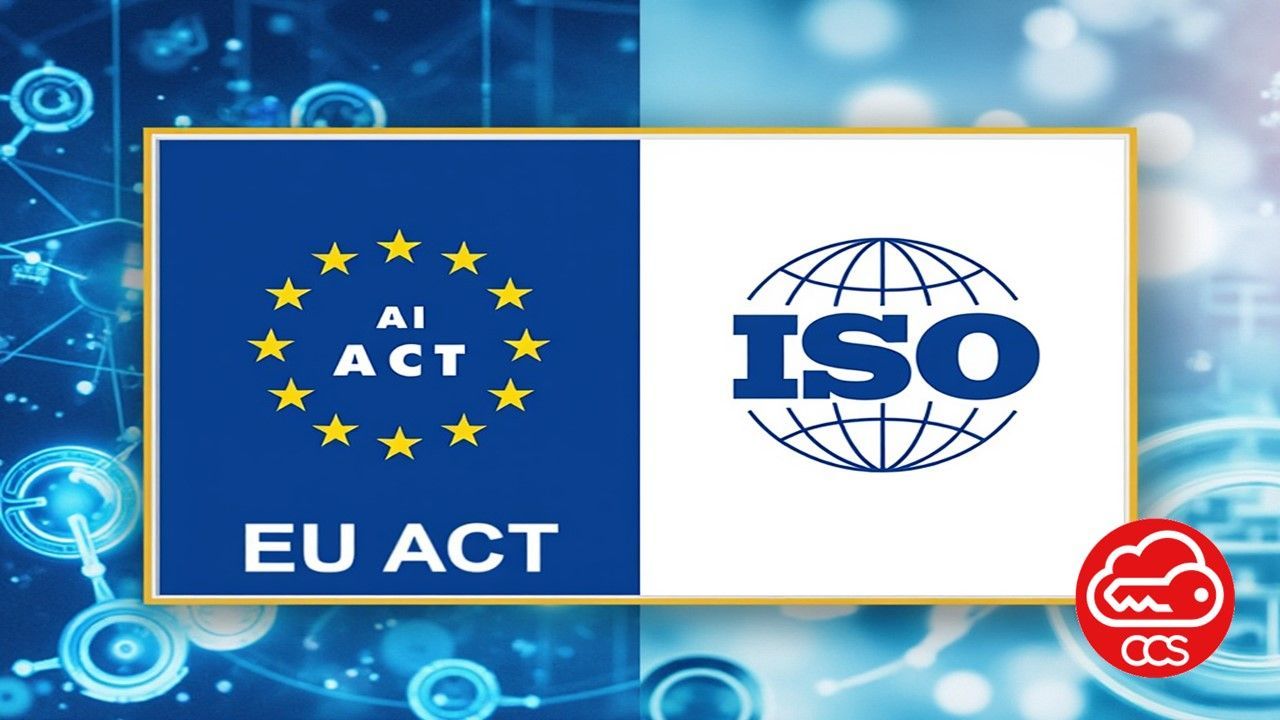How ISO 42001 Can Help Businesses Meet the EU AI Act
As artificial intelligence (AI) continues to transform industries, governments and regulatory bodies are increasingly focusing on ensuring its ethical use and responsible management. Two key frameworks are emerging as essential for businesses: the EU AI Act and ISO 42001: Artificial Intelligence Management System (AIMS). Together, these frameworks aim to regulate and guide the development and deployment of AI in a way that balances innovation with accountability. This article explores how the recently released ISO 42001 can help businesses comply with the EU AI Act and set the foundation for responsible AI use.
Understanding ISO 42001: A New Standard for AI Management
ISO 42001 is an international standard developed to provide a comprehensive framework for the responsible management of AI systems. Released in 2024, it is designed to help organisations develop, implement, and manage AI systems ethically, with a focus on transparency, risk management, data quality, and continuous improvement.
This standard offers practical guidelines that help businesses align their AI practices with regulatory requirements, ensuring the ethical and efficient development and use of AI systems. The ISO 42001 standard emphasises:
- Ethical AI development:
- Ensuring AI systems are designed with ethical considerations at their core.
- Risk management:
- Identifying, assessing, and mitigating risks associated with AI systems.
- Data quality assurance:
- Ensuring high-quality, accurate, and representative data is used for AI training.
- Transparency and accountability:
- Promoting openness in AI decision-making and ensuring systems are accountable for their outcomes.
Key Features of the EU AI Act
The EU AI Act, proposed in 2021, is the first comprehensive regulatory framework governing AI in Europe. It classifies AI systems into different risk categories, including prohibited, high-risk, and low-risk AI, with distinct obligations for each. The Act is particularly stringent on high-risk AI systems, such as those used in critical infrastructure, law enforcement, and biometric identification, requiring strict controls, transparency, and oversight.
Non-compliance with the EU AI Act can result in substantial fines, similar to the General Data Protection Regulation (GDPR). Therefore, businesses need to ensure their AI systems comply with the Act’s provisions to avoid penalties and reputational damage.
How ISO 42001 Aligns with the EU AI Act
One of the strongest advantages of ISO 42001 is its alignment with the EU AI Act. The standard’s focus on ethical AI development, data governance, transparency, and risk management directly complements the EU AI Act’s requirements, especially for high-risk AI systems. Here's how ISO 42001 can help businesses meet the obligations of the EU AI Act:
Risk Management and Compliance
Both ISO 42001 and the EU AI Act emphasise a risk-based approach to AI governance. The EU AI Act classifies AI systems into high-risk and prohibited categories, requiring strict regulatory compliance for systems that may affect human rights, safety, or democratic values. ISO 42001 provides organisations with a structured framework for identifying, managing, and mitigating AI-related risks.
- Risk Management:
- ISO 42001 mandates the implementation of comprehensive risk management strategies, helping businesses comply with the EU AI Act’s requirements for high-risk AI systems.
- Data Governance:
- The standard ensures businesses maintain high data quality, a critical component in preventing biased or discriminatory AI outcomes, aligning with the Act’s provisions on fair AI usage.
Documentation and Transparency
The EU AI Act requires businesses to document their AI systems' decision-making processes, data usage, and risk mitigation strategies. ISO 42001 helps businesses maintain thorough documentation and ensures the transparency of AI operations.
- Explainability:
- ISO 42001 mandates clear and understandable AI decision-making processes, which is crucial under the EU AI Act. It ensures businesses can explain how their AI systems operate, fostering trust with both regulators and users.
- Accountability:
- With ISO 42001’s focus on establishing accountability, businesses can effectively meet the EU AI Act’s requirement for clear oversight and responsibility for AI outcomes.
Governance and Human Oversight
The EU AI Act requires human oversight of AI systems, particularly in high-risk areas such as law enforcement and healthcare. ISO 42001 emphasises the need for human involvement in AI decision-making, ensuring businesses retain ultimate control over AI-driven processes.
- Ethical AI Governance:
- ISO 42001 helps businesses establish ethical governance frameworks, ensuring that human rights and societal values are respected, in line with the EU AI Act.
- Preventing Harm:
- The standard helps organisations avoid deploying harmful AI systems, like those used for biometric surveillance or social scoring, which are banned under the EU AI Act.
Addressing Prohibited and High-Risk Categories
ISO 42001 offers practical tools for identifying and discontinuing AI systems that violate EU AI Act prohibitions, such as untargeted scraping for facial recognition or discriminatory decision-making algorithms.
- High-Risk AI Systems:
- ISO 42001 ensures that high-risk AI systems comply with the Act’s requirements for registration, risk management, and data quality. This alignment helps businesses operate safely within the legal boundaries set by the EU AI Act.
The Business Benefits of ISO 42001
Beyond compliance, ISO 42001 offers several advantages to businesses seeking to manage AI systems responsibly. These include:
- Enhanced AI System Quality and Security
- By adhering to ISO 42001, businesses can ensure their AI systems are secure, reliable, and of high quality. This not only helps meet regulatory requirements but also builds customer and stakeholder trust.
- Cost Reduction and Efficiency
- The ISO framework encourages efficient AI development by streamlining processes and enabling businesses to identify risks early. This reduces the likelihood of costly errors, ensuring smoother, more efficient AI system deployment.
- Improved Stakeholder Confidence
- When businesses follow ISO 42001, stakeholders—including customers, regulators, and investors—can trust that AI systems are safe, ethical, and compliant with international standards.
- Ethical and Responsible AI Use
- ISO 42001 provides a clear framework for ensuring AI is used ethically, particularly in sensitive industries like healthcare, finance, and law enforcement, where the consequences of AI misuse can be severe.
- Regulatory Compliance
- Businesses that follow ISO 42001 will be better positioned to meet not only the requirements of the EU AI Act but also other emerging AI regulations globally. This helps avoid legal issues, fines, and reputational damage associated with non-compliance.
Looking Ahead: Preparing for the Future of AI
As AI continues to evolve, businesses must prepare for the ethical and regulatory challenges that come with this powerful technology. The combination of ISO 42001 and the EU AI Act provides a solid foundation for businesses to navigate this complex landscape. By adopting ISO 42001, companies can create AI systems that are not only innovative but also responsible, ensuring they meet the strict legal standards set by the EU AI Act.
In a world where trust in AI is paramount, ISO 42001 offers a clear pathway for businesses to develop, deploy, and maintain AI systems that respect human rights, promote fairness, and comply with regulations. The future is undeniably AI-driven, and with the right management system in place, businesses can embrace it responsibly.
Why ISO 42001 Matters for Your Business
ISO 42001 is a critical tool for businesses looking to manage AI responsibly and efficiently. By adopting this international standard, companies can ensure their AI systems are compliant with the EU AI Act, secure, transparent, and ethical. The framework not only helps meet regulatory requirements but also enhances AI system quality, reduces development costs, and builds stakeholder trust—ultimately positioning businesses for long-term success in the AI-driven future.




